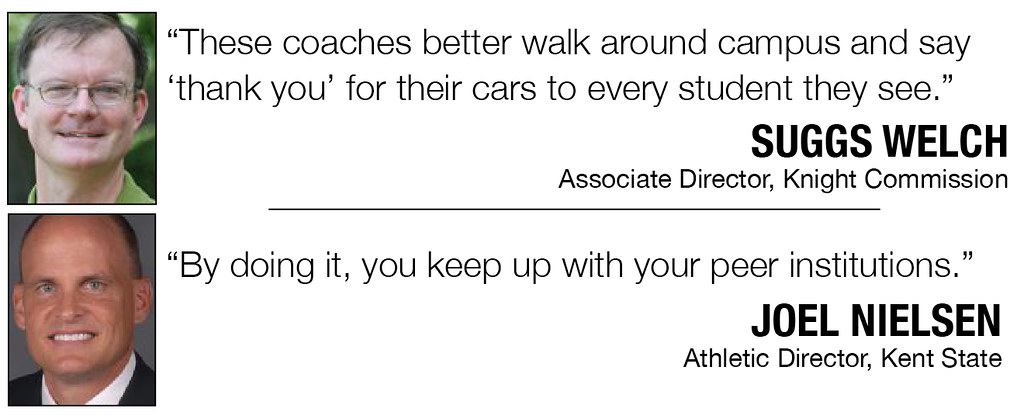Athletic Coaching Perk: Free Cars
Mid American Conference, universities provide over 215 cars or car stipends to its athletic coaches, assistants, and administrators. Central Michigan tops the list, providing 38 cars in total to their athletic department. At Buffalo University one car is not enough. Their head football coach and athletic director receive two stipends a month, with a total value of $800 a piece.
Many schools in the MAC rely on student fees to build the athletic department’s budget. For example, at Ohio University 81% of the athletic budget comes directly from students. That money goes to the athletic department for scholarships, equipment, and cars for coaches.
So this raises the question, are these cars, important as they may be, necessary? Are they worth paying thousands of dollars a month in car insurance, like they do at Eastern Michigan? Are these cars worth giving out over $9,000 a month in stipends, like Buffalo does? The answer is not very simple.
Welch Suggs, an associate director from the Knight Commision, says that the disparity between athletics and education is a growing problem. Suggs thinks these coaches should be thankful for what they’ve been given. “These coaches better be walking around campus saying ‘thank you’ to every student they pass,” said Suggs.
Joel Nielsen, Athletic Director at Kent State University, believes these cars are necessary for the advancement and success of the athletic programs stating, “if we weren’t doing it, we’d be at a competitive disadvantage.”
Tom Symonds, Assistant Athletic Director of Media Relations at Ohio University, agrees saying “Offering automobiles to athletic department personnel as part of their compensation package is essential in obtaining the top coaching and administrative staff to compete at the Division I level.”
The Drake Group is one of the many advocacy groups that believe compensation for coaches has gotten out of control. David Ridpath from the Drake Group used to be one of these coaches receiving the cars. He once enjoyed the perks of the job, “When I was a coach, I got a car. It was great.” But now Ridpath thinks things are out of balance, “you are getting a very good salary, shouldn’t you be able to afford your own car?”
At Central Michigan coaches are given advice on how to develop better relationships with dealers, so that they can continue to receive these cars. Some tips given are: “Personal visit to the dealership. Provide them tickets to an event they are interested in. Learn about their family and provide their wife and kids with gear (within the NCAA rules.)”
While the spending may seem reckless in one perspective, it seems indispensible from another. The problem, it seems, is point of view.
One thing is certain: In today’s world there is an increasing separation between college education and college athletics, yet sometimes they’re directly connected.
Professor James Campbell from the University of Buffalo may have summarized the issue best, “In some universities, the athletic program pretty much pays for itself. At others, it draws resources from academics. I think where it draws its resources from academics, it has to be looked at very closely to see whether that’s worth it.”
Will this issue be solved, or will the gap simply grow even larger? Only time will tell.


